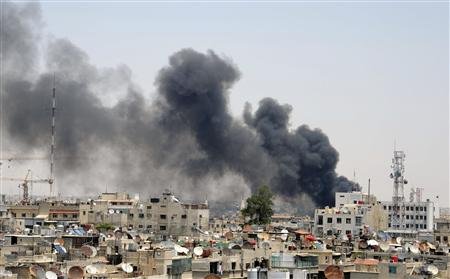
The UN Security Council postponed a vote Wednesday on a Western-drafted resolution calling for sanctions against Syria following a request from international envoy Kofi Annan, diplomats said.
A threat by Russia, President Bashar al-Assad's key ally, to veto the resolution has sparked new Security Council tensions on Syria.
The vote on the resolution is now expected on Thursday, while the five permanent members of the council — Britain, China, France, Russia and United States — hold more negotiations on the Syria crisis, diplomats said.
"We will be voting tomorrow morning," said Britain's UN Ambassador Mark Lyall Grant,.
Britain, backed by the United States, France, Germany and Portugal, has proposed non-military sanctions under Chapter VII of the UN Charter if President Bashar al-Assad does not halt the use of heavy weapons within 10 days of a resolution being passed. It is tied to Chapter VII of the United Nations Charter, which could eventually allow the use of force to end the conflict.
Annan sent a message to the Security Council powers asking for the delay a few hours before the scheduled vote. The UN-Arab League envoy "feels it is still possible to get a compromise with Russia on the resolution," said one council diplomat.
Russia and China — both permanent members of the Security Council along with Britain, France and the United States — have blocked two previous UN resolutions against Syria.
Despite the vote delay, there was no sign that Russia has withdrawn its veto threat. "We cannot accept Chapter VII and the section about sanctions," Russia's Foreign Minister Sergei Lavrov said in Moscow.
Arab League Secretary General Nabil al-Araby said on Wednesday that the meeting of the Arab committee on the Syrian crisis, which is scheduled to be held in Doha on Sunday, would be immediately followed by an emergency meeting of Arab foreign ministers to discuss the situation in Syria.
“Events in Syria are moving fast,” Araby said. “It is difficult to comment on them, and we do not know the consequences.”
He feared violence would accelerate in Syria, and hoped the country would move to democracy in a peaceful way.
He considered the bombing in central Damascus on Wednesday, which targeted the national security building, a serious development in the course of events, and stressed that the league is closely following the matter.
“Violence breeds counter-violence, threatens to drag Syria into a civil war and affects the whole region,” he said. “The only safe way out of the crisis is to respond immediately to the legitimate demands of the Syrian people for a peaceful democratic transition that achieves freedom, pride and dignity.”
German Chancellor Angela Merkel said the suicide attack in Damascus on Wednesday underlined the "urgent" need for a new UN resolution on Syria.
Merkel said that she was aware of reports that the blast claimed the lives of Syria's defense minister, General Daoud Rajha, and President Bashar al-Assad's brother-in-law.
"This shows that it is urgent that the next UN resolution be passed, on which all states in the international community should work so that the abuse of human rights stops and the political process can move forward," she said.
"You see that such a solution has not been possible. That is why I urge all those on the UN Security Council to agree on a joint resolution."
British Foreign Secretary William Hague also said that the suicide bombing showed the need for a UN resolution to end the crisis.
"The situation in Syria is clearly deteriorating," Hague said. "All the members of the UN Security Council have a responsibility to put their weight behind the enforcement of joint special envoy Kofi Annan's plan to end the violence.
"We call on all parties to refrain from violence, and for the Security Council to shoulder its responsibilities."




